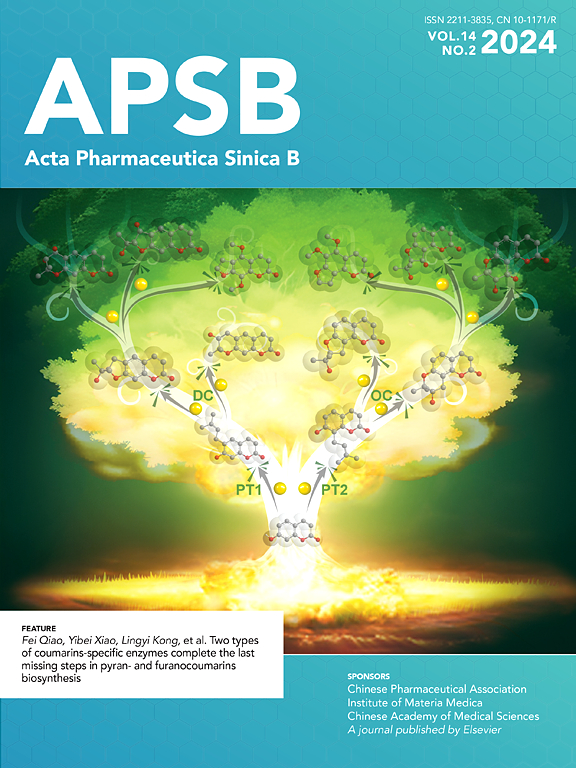Melatonin receptor 1a alleviates sleep fragmentation-aggravated testicular injury in T2DM by suppression of TAB1/TAK1 complex through FGFR1
IF 14.7
1区 医学
Q1 PHARMACOLOGY & PHARMACY
引用次数: 0
Abstract
A major obstacle in type 2 diabetes mellitus (T2DM) is sleep fragmentation (SF), which negatively affects testicular function. However, the underlying mechanisms remain to be elucidated. In this study, we demonstrate that SF induces testicular damage through a mechanism involving lipid metabolism, specifically mediated by melatonin (MEL) receptor 1a (MT1). T2DM mice with SF intervention displayed several deleterious phenotypes such as apoptosis, deregulated lipid metabolism, and impaired testicular function. Unexpectedly, sleep recovery (SR) for 2 consecutive weeks could not completely abrogate SF's detrimental effects on lipid deposition and testicular function. Interestingly, MEL and MT1 agonist 2-iodomelatonin (2IM) effectively improved lipid homeostasis, highlighting MEL/2IM as a promising therapeutic drug for SF-trigged testicular damage. Mechanistically, MEL and 2IM activated FGFR1 and sequentially restrained the crosstalk and physical interaction between TAB1 and TAK1, which ultimately suppressed the phosphorylation of TAK1 to block lipid deposition and cell apoptosis caused by SF. The ameliorating effect of MEL/2IM was overtly nullified in Fgfr1 knockout (Fgfr1-KO+/–) diabetic mice. Meanwhile, testicular-specific overexpression of Tak1 abolished the protective effect of FGF1mut on diabetic mouse testis. Our findings offer valuable insights into the molecular mechanisms underlying the testicular pathogenesis associated with SF and propose a novel therapeutic approach for addressing male infertility in T2DM.

褪黑激素受体1a通过FGFR1抑制TAB1/TAK1复合物,减轻T2DM患者睡眠片段加重的睾丸损伤
2型糖尿病(T2DM)的主要障碍是睡眠片段化(SF),它对睾丸功能产生负面影响。然而,潜在的机制仍有待阐明。在这项研究中,我们证明了SF通过一种涉及脂质代谢的机制诱导睾丸损伤,特别是由褪黑激素(MEL)受体1a (MT1)介导。SF干预的T2DM小鼠表现出多种有害表型,如细胞凋亡、脂质代谢失调和睾丸功能受损。出乎意料的是,连续2周的睡眠恢复(SR)并不能完全消除睡眠对脂质沉积和睾丸功能的有害影响。有趣的是,MEL和MT1激动剂2-碘化褪黑素(2IM)有效地改善了脂质稳态,突出了MEL/2IM作为一种有希望的治疗sf引发睾丸损伤的药物。在机制上,MEL和2IM激活FGFR1,并依次抑制TAB1和TAK1之间的串扰和物理相互作用,最终抑制TAK1的磷酸化,从而阻断SF引起的脂质沉积和细胞凋亡。MEL/2IM的改善作用在Fgfr1敲除(Fgfr1- ko +/ -)糖尿病小鼠中明显无效。同时,睾丸特异性过表达Tak1可消除FGF1mut对糖尿病小鼠睾丸的保护作用。我们的研究结果为SF相关睾丸发病机制的分子机制提供了有价值的见解,并提出了一种解决2型糖尿病男性不育的新治疗方法。
本文章由计算机程序翻译,如有差异,请以英文原文为准。
求助全文
约1分钟内获得全文
求助全文
来源期刊

Acta Pharmaceutica Sinica. B
Pharmacology, Toxicology and Pharmaceutics-General Pharmacology, Toxicology and Pharmaceutics
CiteScore
22.40
自引率
5.50%
发文量
1051
审稿时长
19 weeks
期刊介绍:
The Journal of the Institute of Materia Medica, Chinese Academy of Medical Sciences, and the Chinese Pharmaceutical Association oversees the peer review process for Acta Pharmaceutica Sinica. B (APSB).
Published monthly in English, APSB is dedicated to disseminating significant original research articles, rapid communications, and high-quality reviews that highlight recent advances across various pharmaceutical sciences domains. These encompass pharmacology, pharmaceutics, medicinal chemistry, natural products, pharmacognosy, pharmaceutical analysis, and pharmacokinetics.
A part of the Acta Pharmaceutica Sinica series, established in 1953 and indexed in prominent databases like Chemical Abstracts, Index Medicus, SciFinder Scholar, Biological Abstracts, International Pharmaceutical Abstracts, Cambridge Scientific Abstracts, and Current Bibliography on Science and Technology, APSB is sponsored by the Institute of Materia Medica, Chinese Academy of Medical Sciences, and the Chinese Pharmaceutical Association. Its production and hosting are facilitated by Elsevier B.V. This collaborative effort ensures APSB's commitment to delivering valuable contributions to the pharmaceutical sciences community.
 求助内容:
求助内容: 应助结果提醒方式:
应助结果提醒方式:


